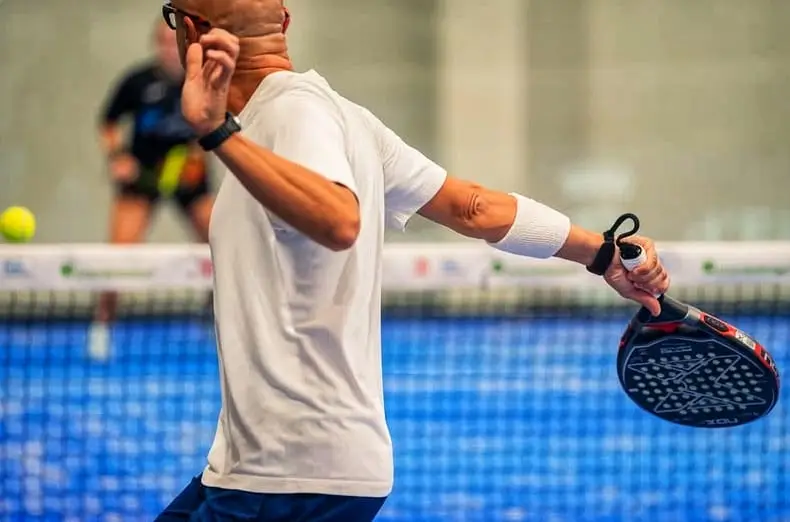Padel is everywhere in Ibiza. With 50 courts across the island, it’s a game woven into everyday life, as much a part of the rhythm here as late Mediterranean lunches and golden sunsets. Across Spain, there are over 20,000 courts, and an astonishing 5.5 million people—10% of the population—play regularly. Compare that to the UK, which has only 200 courts in total, and you begin to understand why visitors to Can Frare often arrive never having heard of padel, only to leave wondering how they’ve lived without it.
This is your invitation to try a sport that’s exploding across the world—one that is social, fast, addictive, and designed for fun.

For those unfamiliar with it, padel is best described as a hybrid of tennis and squash. Played on a smaller court enclosed by glass walls, it allows the ball to be played off the back wall, adding an element of strategy and quick thinking. The court is roughly a third the size of a tennis court, creating a fast-paced, reactive game where angles matter as much as power.
Unlike tennis, serves are always underarm, making the game easier to start and ensuring longer, more fluid rallies. The enclosed space keeps the action constant, rewarding control over sheer force. And since it’s always played in doubles, every game is as much about teamwork and tactics as individual skill.
There’s something about padel that makes it instantly appealing. Perhaps it’s the ease of picking up a racket and rallying within minutes, without the steep learning curve of tennis. The underarm serve removes the pressure of a high-speed start, making it feel welcoming even for first-time players. Or maybe it’s the fact that padel is always played in doubles, meaning every point is a shared experience. With two courts, the game expands—eight players swapping partners, skill levels balancing, competition rising, and laughter filling the air.
In Ibiza, it’s common to see groups of friends heading to the courts in the early evening, fresh from the beach, rackets in hand, laughter in the air. It’s a game that is just as popular among women as it is among men, a sport that doesn’t rely on power but on placement, precision, and rhythm. Even at professional levels, padel is less about brute force and more about smart positioning, a sport that can be played with intensity or at a relaxed pace.
Its accessibility makes it truly multi-generational. Parents and children can play together, as can grandparents and grandchildren, adjusting the pace to suit their level. And unlike many outdoor sports, it can be played long after the sun sets. With floodlit courts across Ibiza, padel comes to life after dark, when the island cools, and the night air carries the sound of rallies deep into the evening.
Padel wasn’t created in a sports lab or by a federation. It was born out of love, leisure, and a little bit of jet-set creativity. In 1969, in Acapulco, Mexico, a couple—Viviana and Enrique Corcuera—unintentionally laid the foundation for what would become a global sport.
Viviana, an elegant Argentine socialite and a passionate racket sports player, was the heart of the game. She and Enrique, a wealthy businessman, found themselves adapting a tennis court at their home, inventing new rules as they went. Viviana’s love for the game was unwavering—so much so that when they moved house and Enrique hesitated about building a proper court at the new Acapulco home, she made it clear:
“No padel court, no Viviana.”
Enrique got the message.
High above Acapulco’s glittering coast, amid fig trees and marigolds, padel was born—its first rallies played beneath a golden Mexican sun. After its creation in Mexico, the sport spread first to Spain and Argentina, where it became more than just a game; it became a passion. In Argentina and Spain, padel took off at an astonishing rate, with parks, clubs, and resorts building courts to meet demand. To this day, Argentina and Spain have dominated the sport, between them winning every single Padel World Championship since the competition began in 1992, in both the men’s and ladies’ doubles.
For decades, padel thrived in Spanish-speaking communities while much of the world remained unaware. Only in recent years has the sport begun to break through internationally—now booming in Italy, Sweden, and beyond. The secret is out, and padel’s next chapter is being written far beyond its Latin roots.
Today, it remains one of the rare sports played in nearly equal numbers by men and women. Unlike many racket sports, where men’s and women’s participation is wildly skewed, padel is truly inclusive—a game where power matters far less than precision, placement, and teamwork.
In Spain, padel is already the second most played sport after football. Across Europe, it’s growing at an unstoppable pace, and yet in the UK, the US, and much of the world, it remains an undiscovered gem—for now.
That won’t last much longer.
Try it here, in Ibiza, where the conditions are perfect, the courts are ready, and the game is more than just a sport—it’s part of the island’s rhythm.
The padel courts are open. The game is calling. Will you step up?
© Copyright 2025 Can Frare Ibiza